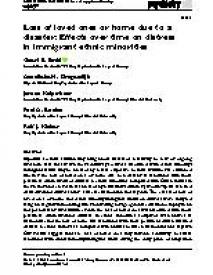Loss of loved ones or home due to a disaster : effects over time on distress in immigrant ethnic minorities
Exposure to mass trauma may bring about increased sensitivity to new or ongoing stressors. It is unclear whether sensitivity to stress associated with ethnic minority/immigrant status may be affected by severe exposure to mass trauma.
We examined whether the loss of loved ones or home due to a disaster is associated with more persistent disaster-related distress in ethnic minorities compared with Dutch natives in the Netherlands. In residents affected by a fireworks disaster (N = 1029), we assessed disaster-related distress after 3 weeks, 18 months, and 4 years. The effects of loss of loved ones or home and ethnic minority/immigrant status on distress were analyzed using latent growth modeling. After controlling for age, gender, education, employment, and post-disaster stressful life events, the loss of loved ones was associated with more persistent disaster-related distress in ethnic minorities compared with natives at 18 months, and the loss of home was associated with more persistent disaster-related distress in ethnic minorities compared with natives between 18 months and 4 years.
Our results suggest that the loss of loved ones may increase sensitivity to stress associated with ethnic minority/immigrant status during the early phase of adaptation to a disaster. Loss of home may lead to further resource loss and thereby increase sensitivity to stress associated with ethnic minority/immigrant status in the long term. Efforts to prevent stress-related psychopathology following mass trauma should specifically target ethnic minority groups, notably refugees and asylum seekers, who often experienced multiple losses of loved ones as well as their homes
In: Transcultural Psychiatry, ISSN 1363-4615 | 55 | 5 | 648-668


